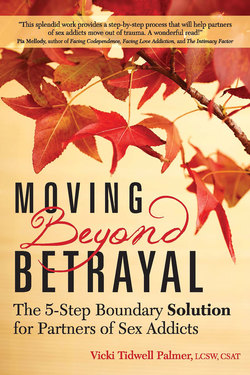Читать книгу Moving Beyond Betrayal - Vicki Tidwell Palmer - Страница 16
На сайте Литреса книга снята с продажи.
ОглавлениеCHAPTER THREE
First Things First: How to Recognize a Good Boundary When You See One
“Boundaries are to protect life, not to limit pleasures.”
—Edwin Louis Cole
THE HUMAN URGE TOWARD SAFETY
One of the most basic human needs is safety. In 1943, Abraham Maslow proposed a theory he called the “Hierarchy of Needs” that has become one of the most widely used theories on human needs. Maslow proposed that all human needs fall into one of the following five categories:
1. Physiological—food, water, sleep.
2. Safety—security of body, relationships, employment, health.
3. Love/belonging—family, friendship, sexual intimacy.
4. Esteem—confidence, achievement, respect.
5. Self-actualization—creativity, knowledge, innovation, achieving one’s potential.
According to Maslow’s theory, the “lower” order needs beginning with the physiological requirement for food and rest, for example, must be met in order for the individual to progress to “higher” level needs. Without a foundation of safety—the second most important need in Maslow’s hierarchy—humans cannot achieve other, higher level needs such as the need for love, connection, creativity, or self-actualization.
Whether you’re conscious of it or not, you are continually using your senses to scan people, places, and situations to determine your relative level of safety. The exploratory behavior of animals is a wonderful example of this instinctual and innate habit. With eyes wide open, ears directed toward incoming sound, and heads turning to survey their territory, all animals—including humans—maintain keen vigilance of their surroundings.
